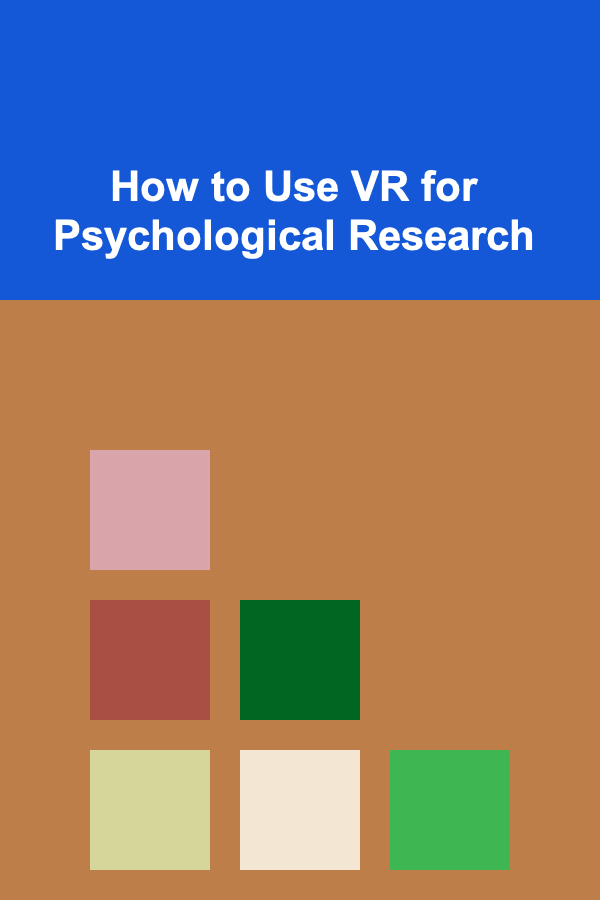
How to Use VR for Psychological Research
ebook include PDF & Audio bundle (Micro Guide)
$12.99$5.99
Limited Time Offer! Order within the next:

Virtual Reality (VR) has transformed the way psychological research is conducted. By providing immersive, controlled environments, VR allows researchers to simulate situations that would be difficult, costly, or even unethical to replicate in real life. VR offers a unique opportunity to observe human behavior in a safe and controlled environment, offering valuable insights into psychological phenomena such as perception, memory, behavior, and emotional responses.
In this article, we will explore how VR can be used in psychological research, from its theoretical foundations to practical applications. We will examine the potential benefits, challenges, and limitations of VR in the field of psychology, and provide an overview of the most common methods and tools used by researchers to implement VR in their studies.
The Role of VR in Psychological Research
VR technology creates an artificial environment that users can interact with in a seemingly real-world way. Through the use of headsets, motion tracking, and haptic feedback, users are placed into a fully immersive 3D environment. This technology has been harnessed to study various aspects of psychology, such as cognition, perception, social behavior, and emotional responses.
The immersive nature of VR creates a controlled, repeatable environment where researchers can manipulate specific variables to study psychological phenomena. Unlike traditional laboratory settings, VR offers greater flexibility in how research stimuli can be presented. Researchers can simulate real-world scenarios, such as navigating through crowded streets, experiencing public speaking, or interacting with virtual characters, which might otherwise be difficult or impossible to recreate.
Cognitive and Behavioral Research
In cognitive psychology, VR can be used to study perception, memory, attention, and decision-making processes in a way that traditional research methods cannot. For example, researchers can design experiments where participants navigate through virtual mazes or environments, providing insights into spatial memory, navigation skills, and how individuals process and retain information.
VR can also be used to study human behavior in social settings. For instance, VR can simulate situations that involve group dynamics, conflict resolution, or social interaction, helping researchers observe how individuals behave in these contexts without the risk of ethical concerns. The flexibility of VR allows for the manipulation of various factors such as group size, interpersonal relationships, or environmental cues, which are difficult to manipulate in real-life situations.
Psychological Disorders and Therapeutic Applications
VR has shown promising results in the treatment of psychological disorders, such as anxiety, post-traumatic stress disorder (PTSD), phobias, and depression. Through exposure therapy, VR immerses patients in controlled environments where they can confront and gradually desensitize themselves to anxiety-provoking stimuli in a safe setting. For instance, individuals with a fear of flying can experience virtual flights, while those with social anxiety can practice public speaking in front of virtual audiences.
VR can also be used to simulate experiences that help individuals with PTSD process traumatic memories in a controlled and therapeutic manner. By revisiting specific memories or scenarios in a safe, immersive environment, patients can work through their trauma under the supervision of a trained therapist, which has proven to be more effective than traditional treatment methods.
Emotional and Physiological Responses
VR can be used to measure emotional and physiological responses to various stimuli. Since VR environments can be carefully controlled, researchers can manipulate specific variables such as visual, auditory, or tactile stimuli to study how these affect individuals' emotional states, heart rate, or other physiological markers. VR has been particularly useful in studying fear responses, stress, and arousal levels, as it can simulate intense situations such as public speaking or social interactions.
For example, researchers have used VR to study how people react to stressful situations by immersing them in simulated environments that trigger anxiety or fear. These VR-based stress tests allow for the collection of real-time data on heart rate variability, skin conductivity, and other physiological markers that would be difficult to capture in real-world settings.
Practical Applications of VR in Psychological Research
Now that we've explored the role of VR in psychological research, let's look at how it is practically used in various areas of study. The following examples highlight the diversity of VR applications and demonstrate how it can be tailored to specific research needs.
Perception and Sensory Research
In the field of perception psychology, VR is used to study how individuals perceive and process sensory information, such as visual or auditory stimuli. Since VR can create highly immersive and realistic environments, it allows researchers to study how humans interact with and make sense of complex sensory input.
Visual Perception Studies
VR has been particularly effective in studying visual perception, including depth perception, motion perception, and visual attention. Researchers can design experiments that manipulate visual cues, such as the size, distance, or movement of objects in a virtual environment, to study how these factors influence perception. For example, VR can simulate an environment where participants must estimate the distance of virtual objects, providing insights into how people perceive space and depth in three-dimensional settings.
Auditory Perception
In addition to visual stimuli, VR can be used to study auditory perception. Researchers can create environments where participants are exposed to specific sound cues or auditory distractions to measure how sound affects attention, memory, or emotional responses. These studies are especially valuable in examining how individuals process complex auditory information in environments with multiple sound sources, such as crowded spaces or noisy public areas.
Social and Emotional Behavior
One of the most promising areas of VR research is in the study of social behavior and emotional responses. VR allows researchers to create complex, social interactions within virtual environments, where participants can interact with virtual characters or other users in real-time.
Social Interaction Studies
Researchers use VR to study social behaviors, such as how people respond to social cues, engage in conversation, or handle conflict. VR can simulate social settings where participants interact with virtual characters or other participants in a controlled manner. These interactions can be manipulated to study variables like body language, facial expressions, and tone of voice, providing insights into nonverbal communication and social dynamics.
For example, VR can simulate a job interview, allowing researchers to observe how participants respond to different social cues, such as an interviewer's body language or tone of voice. These findings can then be applied to real-world settings, such as improving social skills or addressing interpersonal challenges.
Emotional Responses to Virtual Environments
VR can be used to simulate environments that evoke specific emotional responses, such as fear, excitement, or sadness. Researchers can use VR to study how individuals react to these emotions and the factors that influence their emotional regulation. For example, a study might immerse participants in a virtual haunted house to observe how they respond to fear-inducing stimuli or expose them to a virtual tragic event to study how they process sadness.
Cognitive Studies and Memory Research
VR is also used to study cognitive functions like memory, attention, and decision-making. By placing participants in a simulated environment that mimics real-life situations, researchers can study how people navigate complex tasks, remember specific details, or make decisions under pressure.
Spatial Memory and Navigation
One common application of VR in cognitive psychology is studying spatial memory and navigation skills. In VR-based experiments, participants are asked to navigate through virtual mazes or environments, testing their ability to remember locations, landmarks, or spatial layouts. These tasks can be customized to investigate various cognitive processes, such as how individuals use visual cues or spatial landmarks to navigate, or how attention influences memory retention.
Cognitive Load and Attention
VR can also be used to investigate how individuals allocate their attention in complex environments. Researchers can manipulate environmental factors to create scenarios that require participants to multitask or make decisions under cognitive load. These studies help researchers understand how people handle distractions, how multitasking affects decision-making, and how cognitive resources are distributed in various situations.
Ethical Considerations in VR-Based Research
While VR has many advantages in psychological research, it also raises important ethical concerns. As with any form of psychological experimentation, researchers must ensure that VR studies are designed to minimize harm to participants and respect their rights and dignity. Some of the key ethical considerations include:
- Informed Consent: Participants must be fully informed about the nature of the study, including the virtual environment they will be exposed to and any potential risks or discomforts.
- Psychological Well-being: Since VR can induce strong emotional responses, researchers must take precautions to ensure that participants are not subjected to excessive stress, anxiety, or trauma. Researchers should monitor participants for signs of distress and provide debriefing or support when necessary.
- Privacy and Data Security: VR research often involves the collection of sensitive data, such as physiological responses or personal behaviors. Researchers must ensure that participants' data is handled securely and that their privacy is protected.
Conclusion
Virtual reality has opened up new possibilities for psychological research by allowing researchers to create controlled, immersive environments to study a wide range of psychological phenomena. From cognitive and behavioral studies to emotional and social research, VR provides a powerful tool to observe and analyze human behavior in ways that were previously impossible. However, it is essential to consider the ethical implications and potential risks associated with VR-based research to ensure that it is conducted responsibly and with respect for participants.
As VR technology continues to evolve, it is likely that its applications in psychological research will expand, offering even greater opportunities for understanding the human mind and improving therapeutic interventions. With careful planning, ethical consideration, and a commitment to innovation, VR has the potential to transform the field of psychology and contribute to meaningful advances in mental health care, human behavior research, and beyond.

How to Organize Your Garage with Budget-Friendly Storage Ideas
Read More
How to Set the Mood for a Festive Holiday Dinner Party with Decor
Read More
How to Throw an Amazing Event with These Thrifty Party Planning Tips
Read More
How to Use Command Hooks for Creative Storage Solutions
Read More
How To Interpret the Color of Stars
Read More
How to Create a Culturally Rich Home Environment
Read MoreOther Products

How to Organize Your Garage with Budget-Friendly Storage Ideas
Read More
How to Set the Mood for a Festive Holiday Dinner Party with Decor
Read More
How to Throw an Amazing Event with These Thrifty Party Planning Tips
Read More
How to Use Command Hooks for Creative Storage Solutions
Read More
How To Interpret the Color of Stars
Read More